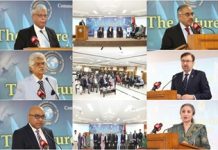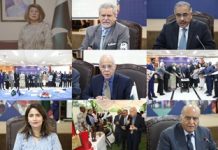In order to come clean on the subject of missing persons, which is of immediate concern to their families and society in general, the government must establish a judicial commission or council to investigate each and every case of disappearance
The chilling news that hundreds of Pakistani citizens have disappeared without any information about who is holding them, where and why has prompted a suitably anguished media and public response. Families of the missing persons have held press conferences, knocked at many doors for justice and occasionally demonstrated in the streets to draw the attention of the public, government and media to their suffering.
Secretly arresting citizens, whatever the accusations, real or fabricated, against them and placing them under detention or subjecting them to torture and violence are not the actions of a civilised society, which we rightly claim ours to be, nor is it good for the image of the country, society or state.
But one should not protest against disappearances of citizens on grounds of ‘image’ and ‘feeling’. These incidents are inhuman, unlawful and violate the human and civil rights of the individual. The presumption of innocence until proven guilty is a universal requirement of justice. This principle equally applies to individuals who are charged of what the state may regard as terrorist, anti-state or any other serious crimes. Every person has a right to know why he or she has been detained and on what charges, and to be tried in open courts with the right of open, legal defence.
Unfortunately many states around the world have stained their hands and historical memories with the blood of innocent men and women. This includes powerful countries of our time and of the past. If we include the ideologically motivated genocide of peasantry and elimination of ‘counter revolutionaries’ by Joseph Stalin and other rulers in the last century, the record of the era of modern nation-states doesn’t look very different from other dark periods of human history. The only difference is that wherever state authorities committed crimes against humanity, the rest of the world, or at least some sections of it, protested and remembered them, for the sake of the greater human objective of standing up to tyrants.
That century and those agonising times have receded, but not the collective human memory of the misdeeds of bad rulers or the long-term social and political effects of torture and genocide on their societies. Iraq under Saddam Hussein readily comes to my mind. One can attribute a lot of sectarian and ethnic strife to foreign occupation, but massacres, mass prisons and torture of members of Kurdish and Shia communities sowed the seeds of the present conflicts. The lesson, a very important lesson, is that unlawful acts of the state and enactment of draconian laws are the worst means to build a state or exercise political power. Gradually injustice and unlawfulness erode the moral foundation of the authority of rulers and state.
What can we learn from the mistakes of some of the Latin American countries, like Chile under Pinochet and Argentina under its diabolical military rule? Both military regimes were notorious for the disappearances of ten of thousands of political opponents. The military rulers of these two countries and many others in less unfortunate regions of the world truly believed that their capturing and staying in power was in the national interest. Anyone who opposed them or contested their claims was depicted as an enemy of the state and the people. Their ‘information’ or propaganda line was that they were serving a great national cause by putting political opponents in the dungeons or to the sword. Personal ambitions disguised as national interests overshadowed their political logic.
The verdict of history and people has been against such rulers. Their reasons for capturing power, style of politics and treatment of political opponents have discredited them. The political effects of their rule have been quite the opposite of what they had promised their nations, and in many cases their painful rules have left deep imprints on national psyches.
I always thought that Pakistan would never become one of those countries where families and friends run pillar to post to find out what happened to their sons, fathers, and brothers. Like any other conscientious Pakistani I am truly shocked to learn through persistent reports in the press and our popular grapevine that people have in fact been disappearing without trace. These chilling reports are now the subject of controversy and debate in the country and outside, with op-ed pieces around the world taking notice of them. The ‘soft’ and ‘benign’ image of military rule may be a thing of the past, or just a political gimmick.
Fair, impartial and quick investigations must be made to determine the number of missing people and who has taken them. The Human Rights Commission of Pakistan and other international bodies concerned with issues of human rights have done their own probing and pointed fingers at the state agencies. The government, really the man at the top, General Pervez Musharraf, tried to deflect accusations of state involvement by suggesting that jihadi organisations have taken the disappeared persons away. Such statements may not bail the government out in the environment of growing distrust created by the contradictions between what it says and does.
In order to come clean on this subject, which is of immediate concern to the missing persons’ families and society in general, it must establish a judicial commission or council to investigate each and every case of disappearance. On the initiative of the Supreme Court of Pakistan, under Justice Iftikhar Mohammad Chaudhry, a number of missing persons have rejoined their families. This is one of the many reasons that the chief justice has found a place in the hearts of so many countrymen.
The tales returnees tell about who arrested them are very different from what the government wants us to believe. Personal accounts of the families that have witnessed the midnight knock at their doors indicate that state agencies are responsible. This is a sobering splash of cold water on the president and his associates, who make different claims.
The states in our part of the world have taken the conduct of some Western democratic states as licence for their methods of dealing with political offences. These states, that prided themselves on a tradition of rule of law, are now crossing all barriers of legitimacy in their war on terror. Our government, it seems, has increasingly targeted ethnic activists in Sindh and Balochistan and the religious elements associated with extremist outfits.
It is the primary responsibility of the state to ensure the security of citizens; agencies and other departments of the government may arrest suspects, but in a lawful manner, without violating the fundamental human and civil rights of the accused. The state must first set standards for justice and respect of law, and then expect citizens to do the same.
The author is a professor of Political Science at the Lahore University of Management Sciences.












